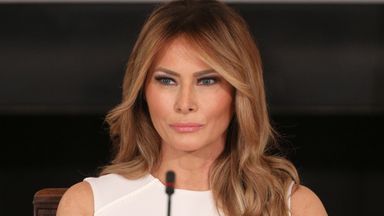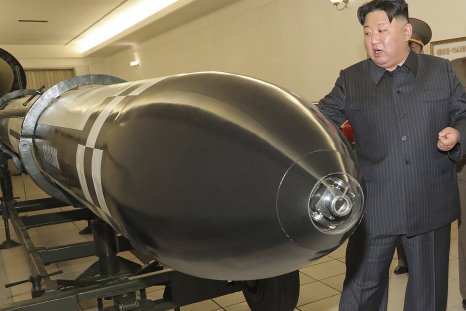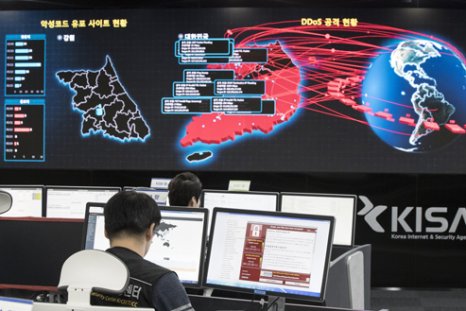The results of this weekend's presidential contest in Venezuela could shift the flow of migrants heading for the United States and elsewhere in the Americas — just in time for the November election.
Over 545,000 Venezuelans have entered the U.S. as either refugees or migrants, having fled from Nicolas Maduro's authoritarian leadership. His rule has lasted over a decade and is now being challenged by María Corina Machado's opposition party and its chosen candidate, Edmundo González.
While those numbers trail Colombia's three million or so arrivals, as well as Peru's 1.5 million, Venezuelans have been increasingly climbing up the top-ten list for nationalities encountered at the U.S.-Mexico border in recent years.
Over those same few years, migrants have faced restrictions put in place by both the Trump and now Biden administrations, while the issue of border security takes center-stage in the race for the White House.
"So much of what happens in Latin America, certainly in the case of Venezuela, is also tied up with what happens in U.S. politics," Professor Alejandro Velasco, a specialist in Latin American history at NYU, told Newsweek.
"So, whatever we talk about now, I think would only really be pertinent to what happens in November, and in November we might be having a very different conversation depending on what happens in the United States," Velasco continued.
Millions of Venezuelans have left the country the past decade since Maduro took office, spurred by Maduro's economic policies that have led to hyperinflation, other regional pressures and, more recently, the pandemic.
"[Venezuelans] have generally lost a sense of hope in terms of things changing," Rachel Schmidtke, senior advocate for Latin America at Refugees International, told Newsweek. "Many have been able to kind of hold out, up until the last year or so, and have just hit a breaking point."
Schmidtke said Venezuelans have been fleeing human rights violations and an unstable economy, hoping for a better life in nearby countries or the U.S.
Since 2010, the number of Venezuelan immigrants in the U.S. has nearly tripled, according to the Migration Policy Institute's figures.
While pandemic and Trump-era policies hampered the flow of immigrants generally into the country, President Biden announced more protections for up to 30,000 people each month, including from other select countries.
Then, in June, a limit on asylum entries was announced by Biden, leading to a plunge in unauthorized crossings.
"I think the U.S. has accepted more Venezuelans, which is great, but if we look at the numbers, Colombia has, I think, over two million Venezuelans that they've accepted and actually given a legal status to," Schmidtke added.
"So a lot of countries have actually been more welcoming than the United States and, relative to their population, have accepted far more Venezuelans."
Schmidtke said that despite those barriers, the refugees she has spoken to making the journey to the U.S. border are not worried about hostility towards them from Americans.
"I haven't heard too much directly from people being worried about xenophobia," she said. "I think also because they're experiencing xenophobia on the root northwards, or they might have experienced it already in host countries prior to leaving, I think many are accustomed to it as it is... they are not particularly jaded."
A reverse in migration trends is possible
Sunday's election between Maduro, the unpopular incumbent, and the popular opposition could change the flow of migration, Velasco and Schmidtke told Newsweek, but the outcome is still unclear.
Velasco said that Maduro does not seem to have a legitimate path to victory, but he pointed out that the leader has been known to overturn elections in the past – namely in 2017, when initial results showed he had lost.
"What we have seen in previous moments of high political tension resulting in an election where Chavismo remains in power is an initial wave of migration, based on the anticipation, that things will not improve, but that it can only get worse from there," Velasco added.
Chavismo is the term for the left-wing socialist policies first introduced under the Hugo Chavez regime and continued under Maduro, his successor.
Maduro has tried to show Venezuelans, both at home and abroad, that the country is more stable than it was, pointing to a small bump in economic growth, through the broader economy is still in shambles with many unable to afford food and basic necessities.
For the middle-class, higher-educated citizens who fled in the early years of his time in office, that has not been enough to woo them back home again, whereas a victory for the opposition party might, Velasco said.
Polls have shown that up to a third of the population is considering fleeing if Maduro is reelected.
Machado, while the figurehead of the opposition, would not personally take the presidency if her party won. Still, her movement has gone from having an outside chance to a legitimate shot at winning Sunday's election in short order, stirring up a passionate following by promising change not seen in the country in decades.
"That might lead to a potential return-migration, not from the folks who have been leaving over the past, say four or five years, which are primarily drawn from the ranks of very impoverished or populous sectors of Venezuelans," Velasco said.
"They might see an opposition-in-power government as not especially friendly to their interests, so they might want to wait it out for a little bit," he continued.
"But who you will likely see coming back are the middle classes, maybe lower-middle classes, who were forced to leave because of the economic instability, who remain extremely emotionally tied to Venezuela, who have had a very difficult time maintaining standards of living abroad and who really need just a little bit of a sense of hope will change in order to come back to Venezuela."
Schmidtke added that if even if Sunday's election does spur another wave of migrants north, numbers generally increase between August and October anyway.
"The other thing that we're preparing for is what happens in the United States and our elections," she said. "Because, if there's a Trump administration or a Harris administration, the response to people migrating towards the United States is going to be drastically different."
Do you have a story Newsweek should be covering? Do you have any questions about this story? Contact LiveNews@newsweek.com
Disclaimer: The copyright of this article belongs to the original author. Reposting this article is solely for the purpose of information dissemination and does not constitute any investment advice. If there is any infringement, please contact us immediately. We will make corrections or deletions as necessary. Thank you.



